My Hometown TOJYO
My Hometown TOJYO
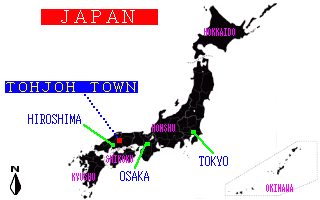
"A Cultured Town in the Forest." ("MORI NO BUNKA TOSHI" in Japanese.) is the catch phrase of my hometown TOJYO town of SHOBARA city.
TOJYO Town is located in CHUUGOKU district, a western part of Japan.
Its longitude and latitude are 133 degrees 16 minutes East, 34 degrees 53 minutes North.
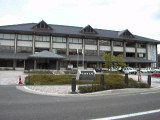 Its dimensions are 305.27km2 and population is about 9000.
Its dimensions are 305.27km2 and population is about 9000.
The height above sea level at the central TOJYO is 315 meters. There is the mountain over 1200 meters height at the north end of the town.
Though the average temperature is 12 degrees Celcius, there are some hot days over 30 degrees Celcius in the summer and some cold mornings under -5 degrees Celcius in the winter.
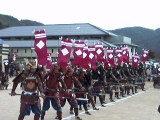 Since the medieval ages, TOJYO Town has been prospered as an important place connecting between SAN-YOH area(the Southern part of CHUUGOKU district) and SAN-IN area(the Northern part of it).
Since the medieval ages, TOJYO Town has been prospered as an important place connecting between SAN-YOH area(the Southern part of CHUUGOKU district) and SAN-IN area(the Northern part of it).
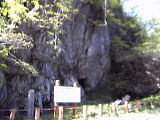 In addition, some ruins of ancient residence were discovered here.
In addition, some ruins of ancient residence were discovered here.
As it is at the center of the CHUUGOKU Upland, there are deep woods all around the town.
At the western area of TOJYO town, there is the quasi-national park "TAISHAKU-KYOU" which is famous for the beautiful colored leaves in the autumn.
At the northern area, there are "NEKO-YAMA" and "DOUGO-YAMA" which are famous for skiing resorts in the winter.
Special food products of TOJYO Town are Beef of Japanese cattle, Sake(Japanese rice wine) made from fresh rice and clean water, Apple cultivated in highlands farm, and various wild plants. These are blessings of fruitful nature here.
How to Come to TOJYO Town.
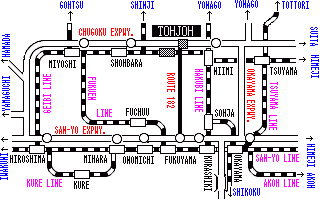
If you are outside of Japan, investigate how to come to the following cities in Japan by yourself.
- From HIROSHIMA city
- JR(Japan Railway) GEIBI Line is connecting between HIROSHIMA city and TOJYO Town. But there is no direct express train and changing train on the way of GEIBI Line is very inconvenient.
You had better to use the Highway Buses of BIHOKU-KOHTSUU which are 3 goings and comings a day. You can get on them from the Highway Bus Terminal at North Gate of HIROSHIMA Station. It spends about 2 hours.
If you come here by car, drive on CHUGOKU EXPRESSWAY and get off at TOJYO IC(InterChange), the next of SHOBARA IC.
- From FUKUYAMA city
- From FUKUYAMA Station, there are the Local Buses of CHUUGOKU-BUS which are 3 goings and comings a day. But it spends about 2 hours because they are stopping many bus stops on the way.
If you come here by car, drive up to the north on Route 182. You can reach here in 1 hour only.
- From OKAYAMA city
- Get on the Limited Express train YAKUMO on JR HAKUBI Line at OKAYAMA station. At NIIMI station after 1 hour ride from OKAYAMA, change train to GEIBI Line. It spends about 40 minutes to get to TOJYO station from NIIMI.
If you come here by car, Drive to the west on SAN-YO EXPRESSWAY and get off at FUKUYAMA-HIGASHI IC. From FUKUYAMA-HIGASHI IC, drive up to the north on Route 182.
If you want to save the charge of EXPRESSWAY, drive up to the north along the Takahashi River on Route 180. From NIIMI city, drive on Route 182 to TOJYO Town.
If you have much money and much time, drive up to the north on the OKAYAMA EXPRESSWAY and change way to CHUGOKU EXPRESSWAY at HOKUBO Junction. Drive to the west and get off at TOJYO IC, the next of NIIMI IC.
- From OSAKA city
- If you come here by train, get on JR SAN-YO SHINKANSEN train at SHIN-OSAKA station and get off at OKAYAMA station. Change train to JR HAKUBI Line at OKAYAMA and change train again to JR GEIBI Line at NIIMI Station. It takes about 3 hours from SHIN-OSAKA to TOJYO station.
You can also come here by the Highway Buses which are 5 goings and comings a day from HANKYU BUS TERMINAL at SHIN-OSAKA station. It takes 4 hours but half charge of train fee.
If you come here by car, Drive to the west on CHUGOKU EXPRESSWAY and get off at TOJYO IC, the next of NIIMI IC. Don't make mistake the IC to get off because there is "HYOGO-TOJYO IC" on the way.
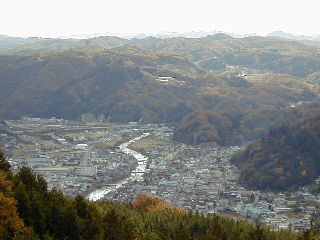
Beautiful nature, clear air and water, fresh foods and enough space to live are here in TOJYO Town. Why don't you come here to make sure of them?

Back to the MENU


 Its dimensions are 305.27km2 and population is about 9000.
Its dimensions are 305.27km2 and population is about 9000.  Since the medieval ages, TOJYO Town has been prospered as an important place connecting between SAN-YOH area(the Southern part of CHUUGOKU district) and SAN-IN area(the Northern part of it).
Since the medieval ages, TOJYO Town has been prospered as an important place connecting between SAN-YOH area(the Southern part of CHUUGOKU district) and SAN-IN area(the Northern part of it). In addition, some ruins of ancient residence were discovered here.
In addition, some ruins of ancient residence were discovered here.

